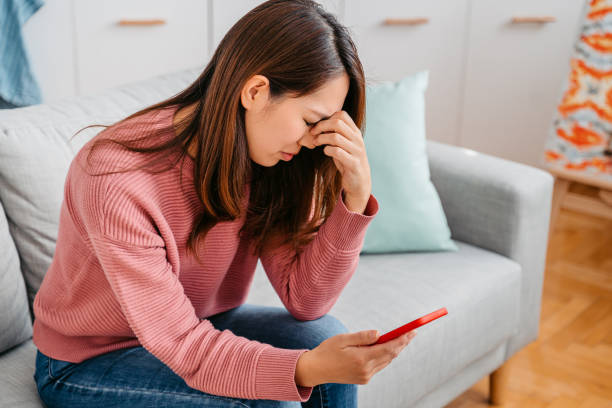
In today’s digital age, social media platforms have become an integral part of our lives, providing a platform for connection, information sharing, and self-expression. However, the rise of social media has also led to an increase in self-diagnosis of mental health conditions. In a lot of ways, this makes sense: many of us weren’t diagnosed as children and have struggled with our mental health for our entire lives. Finding a possible explanation can feel like someone just turned all the lights on in a dark room. You might feel less alone and more understood. You might consider being easier on yourself for things you’ve always felt shame for. However, while social media can offer valuable insights and support, it’s essential to approach self-diagnosis with caution and seek professional guidance. You can learn a lot online, and that information can be helpful when determining what to speak to a professional about, but the key is to speak to the professional. As a therapist in Woodland Hills, I offer therapy for young adults that often includes collaboration and “homework.” But ultimately, it is guided by me, a qualified, neutral professional.
Ways You May Be Self-Diagnosing Your Mental Health Through Social Media
- The Danger of Misinterpretation:
You aren’t fully comprehending what you are seeing online. Misinterpreting generalized information or comparing oneself to others on social media can lead to inaccurate self-diagnosis, potentially causing

unnecessary anxiety or misdirection in seeking appropriate help. The Complexity of Mental Health There are ways that your mental health intersects that get missed in generic posts. Self-diagnosis based on limited information from social media can oversimplify or overlook crucial aspects of mental health conditions, leading to misguided self-treatment or delayed professional intervention.
- Confirmation Bias and Selective Exposure:
Once you have seen, watched, liked, and subscribed to accounts about what you’ve self-diagnosed, you will see more and more “evidence” come across your feed. Selective exposure to specific narratives on social media may create a skewed perception of mental health, contributing to inaccurate self-diagnosis.
- Absence of Professional Assessment:
You’re not recruiting a qualified professional to assess you. Self-diagnosis without professional assessment can lead to misdiagnosis, inadequate treatment, or overlooking underlying conditions. Mental health professionals possess the knowledge, training, and experience necessary to evaluate symptoms accurately, provide a comprehensive diagnosis, and develop personalized treatment plans.
4 Things to Keep in mind when Navigating Mental Health in the Era of Social Media
1) Set boundaries:

It can be difficult to stop scrolling, especially when you feel you are being seen or validated by what you have found. Algorithms are so advanced that they are able to keep you online by predicting what you will want to see. Deciding whether to put your phone away or stop reading can be tricky. Allocate specific time for social media use and establish limits to avoid excessive scrolling or emotional overload.
This can feel like an impossible ask if you are used to scrolling before bed or to help you wake up in the morning. You might scroll when you are stressed as a way to disconnect from your anxiety. Or you may rely on the information you obtain from social media and your online social groups to keep you feeling steady and supported.
When you are setting your specific time, think to yourself what will benefit you most. When is a good time to scroll social media? Is it a certain time of day or day of the week? Can you set a timer or delegate a friend or family member to scroll with you and then put a stop to both your thumbs? If you do most of your scrolling on your phone and use your phone as your alarm clock, consider a different alarm and plug your phone in across the room at night or elsewhere. This might be something you do initially to get used to it, then adapt as you go.
You may also have to set boundaries with people in your day-to-day life. Well-meaning, they tend to send you articles or video clips that remind them of you. Again, this information is no replacement for a diagnosis. It can also tempt you to go down a rabbit hole of related articles or videos when you are trying hard not to. Setting boundaries can be tricky, especially when you know the person doesn’t mean any harm. You might choose to say something like, “Thank you for sharing this with me. I am currently only reading information or watching videos that my therapist recommends as part of my treatment.” Or you might say, “I appreciate this help, but I’m trying to reduce my research time right now and focus on being present in my life.”
Remember that boundaries exist as information. Sharing your boundaries with the people in your life gives them the knowledge and ability to show you care and respect. It is not a big ask for people to mind your boundaries, just as you would be willing to do for them.
2) Practice self-awareness:
Be mindful of how social media makes you feel, and take breaks if needed. This requires you to unpack your overall emotions; the positive feedback you might experience in your brain at the time of engagement is very different from how

you feel afterward. Remember that you cannot live your life with your phone in your hand; if you don’t feel okay without it, that is an untenable situation.
Being self-aware means that you are connected to your emotional, mental, and physical state in real time. You take note of triggers that cause discomfort. You connect with your senses to remain present in situations – what can you hear, smell, touch, see, or taste? What sensations do you experience in your body when you are upset, nervous, or anxious? Do you ever notice that you feel “numb” and unable to process any sensory information?
When you are self-aware of your mental and emotional state, you are able to identify what is occurring and when. Again, this is about being aware, not unpacking and analyzing every aspect of an experience. Your observations can guide you to solutions much more easily if you are not also judging yourself or questioning yourself. For example, if you are aware that a specific app is more likely to entice you to keep scrolling as you seek more and more information about your mental health, that is something to know. It doesn’t mean you immediately give up that app. But it means you have a starting place from which to make a plan for how to adjust your behavior.
Self-awareness also requires you to speak to yourself about what is going on. “I am not going to diagnose myself through this video” is a strong statement you can make. “This video has brought up a lot of questions that I can take to a trusted therapist” is a good adjustment to make when you feel like you are learning and questioning.
Being self-aware also gives you the power to reach out for help and support, from those close to you and from professionals. When you notice you are fixating more and more on social media education and less on real-world situations and information, that may be a cue to seek some guidance. No one can go through these things on their own. Knowing when you need community will help you get through triggering times.
Make space in your self-care routine for reflection and consideration. How often you need that is up to you. It might be five minutes per night or an hour every Sunday morning. It might be an hour every night, or you might determine that you won’t go a certain number of days in a row without checking in with yourself. Whether you meditate, journal, paint, go for a walk, or do some other activity that connects you with your inner world, set aside that time. Give yourself permission, to be honest with yourself.
3) Prioritize real-life connections:

It can feel like a security blanket to have an online community. Sometimes, it can feel like no one else is there for you; you can reach for your online community to feel less isolated. If you don’t want to have to talk to someone, you can simply observe. If you do, you can connect with them anytime; you don’t have to leave the comfort of your own home to socialize, and you can wear your pajamas if you want to! While having access to an online community can be beneficial in broadening horizons and finding people you might not have otherwise crossed paths with.
Cultivate and nurture relationships offline, ensuring a balance between online and offline interactions. When you have a social event to attend, it is much easier to put aside your social media. It can also help you to connect with people who can be there for you in real time. Once we get too comfortable sitting at home behind a screen, it can feel very daunting to venture out to social gatherings. Making sure to prioritize your real-life connections is about having the right mindset and choosing actions and habits that support your social goals.
This doesn’t mean you won’t need time alone. In fact, most people require some alone time in order to properly process their thoughts and feelings, as well as rest and energize for the next socialization. When you prioritize real-life connections, you still have self-care boundaries in place that facilitate your mental wellness.
Many people feel understood and supported by interacting with the social media that they are using to self-diagnose. When you transition that understanding and support to people who know and love you in real life, it is fulfilling and healing. Being vulnerable can be scary, and it requires vulnerability to open up and share with your loved ones about your struggles. You may only choose one or two people with whom to be completely honest. If you have a therapist to speak to as well, you will receive a lot of interpersonal support from them. They can also help you determine how you will share, what you will share, and when you will share with the various connections in your life.
4) Seek professional help:
If social media use significantly impacts your mental health, consider reaching out to a mental health professional for guidance and support. A professional can assist you in breaking the cycle of your social media use. Seeking professional

help is also crucial for accurate diagnosis and appropriate treatment. Mental health professionals can conduct thorough assessments, consider various factors, and offer evidence-based interventions tailored to individual needs. Our practice of therapists in Woodland Hills sees folks of all ages and in all stages of their diagnostic journey.
If you’ve never attended therapy, you might not be sure what it will look like for you. There are many misconceptions about therapy in general, and some truths to know. Number one, every individual is going to have a unique experience with therapy. Number two, you can attend therapy for a variety of reasons. Number three, there is no set timeline for therapeutic treatment. A professional can not only provide you with a diagnosis when needed but contextualize and validate some symptoms even if they don’t lead to an official diagnosis. There is a lot of overlap in the brain, where various causes can lead to the same symptoms. These symptoms will deserve treatment regardless of whether or not they are part of a diagnosed mental illness.
When working with a therapist, you will address, uncover, and explore many issues. If you are an adult who suspects you have an undiagnosed condition, you may have childhood memories and experiences to unpack. Should you receive a diagnosis, there will be conflicting emotions involved. You will feel relieved to have an answer, and you will grieve what could have been if you had had the appropriate tools to handle it. Revisiting some of your memories and reframing them will help you to move forward from those disappointments. Moving on from the present time, you will develop coping skills and make a mental health plan in order to maintain your wellness. Strategies for symptom management and recalibrating your nervous system are game changers.
Many people find that they reach for online validation and self-diagnose because they have struggled to be listened to and taken seriously in the past. If this is you, you’re not the only person in this situation. It is a terrible feeling to feel all alone in your struggles, to be gaslit, to be ignored. It makes perfect sense that you have sought answers for yourself, and sought comfort in information. You are worthy of more support than that. Now is the time to honor yourself by seeking the truth. You are deserving of being listened to, and have someone sit with you to determine how to help you. Whether it leads to a mental health diagnosis or not, if you have been struggling with symptoms, you will be able to work through them when guided by a mental health professional.
Embracing You Therapy Is Here To Work With You!
While there are more information and share about mental health struggles today, there can still be misinformation and judgment if you are struggling with addiction, depression, OCD, or any other mental health needs. Here at Embracing You Therapy Group, we believe in getting to know the whole person before making a diagnosis and only offering one if we believe is going to help you in your journey of recovery and self-acceptance. We’ll work together to find tools that help you respond to life in a healthy, calm way. Contact us today for your complimentary 20-minute phone consultation with our Client Care Coordinator.




